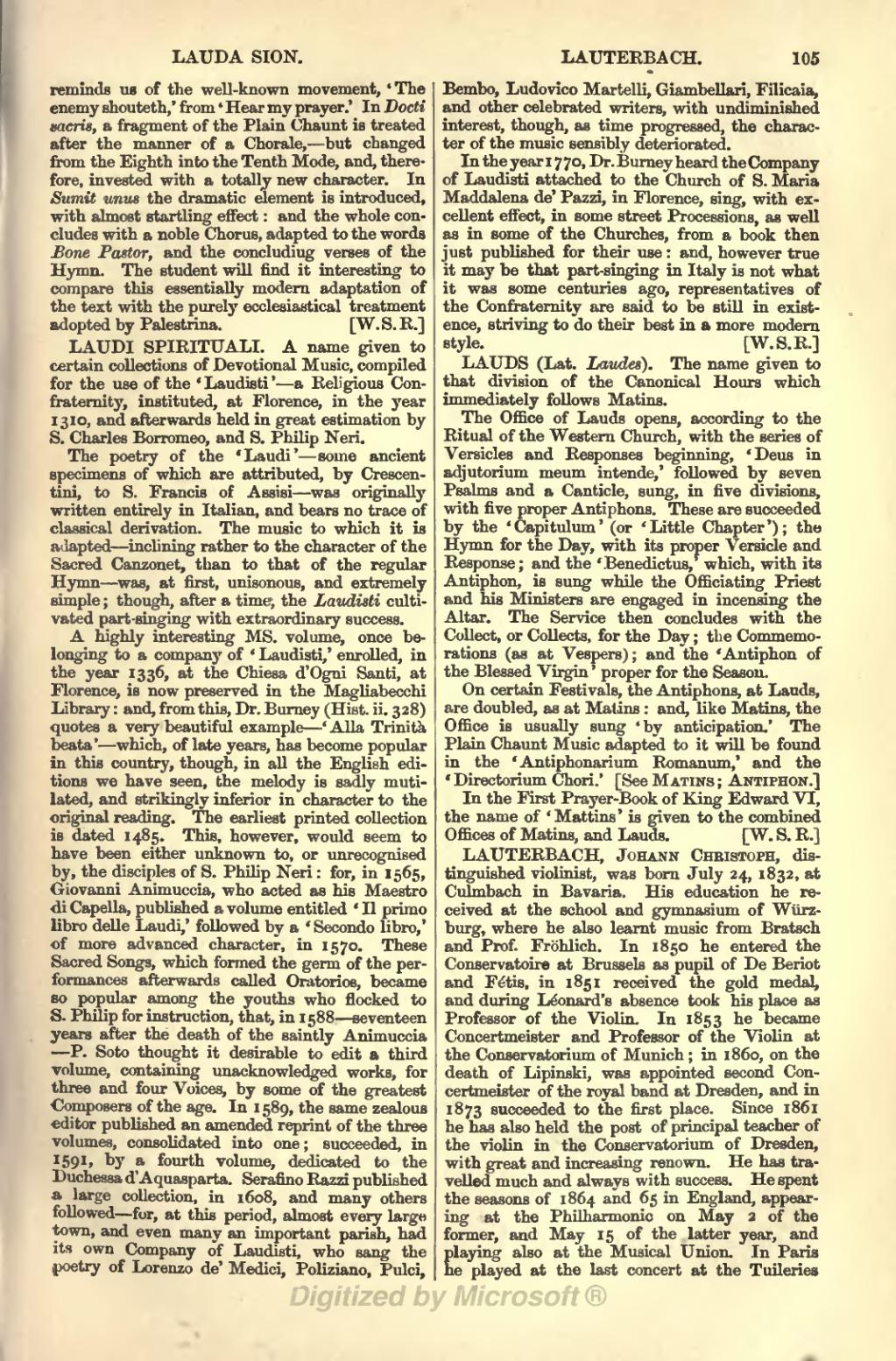reminds us of the well-known movement, 'The enemy shouteth,' from 'Hear my prayer.' In Docti sacris, a fragment of the Plain Chaunt is treated after the manner of a Chorale,—but changed from the Eighth into the Tenth Mode, and, therefore, invested with a totally new character. In Sumit unus the dramatic element is introduced, with almost startling effect: and the whole concludes with a noble Chorus, adapted to the words Bone Pastor, and the concluding verses of the Hymn. The student will find it interesting to compare this essentially modern adaptation of the text with the purely ecclesiastical treatment adopted by Palestrina.
[ W. S. R. ]
LAUDI SPIRITUALI. A name given to certain collections of Devotional Music, compiled for the use of the 'Laudisti'—a Religious Confraternity, instituted, at Florence, in the year 1310, and afterwards held in great estimation by S. Charles Borromeo, and S. Philip Neri.
The poetry of the 'Laudi'—some ancient specimens of which are attributed, by Crescentini, to S. Francis of Assisi—was originally written entirely in Italian, and bears no trace of classical derivation. The music to which it is adapted—inclining rather to the character of the Sacred Canzonet, than to that of the regular Hymn—was, at first, unisonous, and extremely simple; though, after a time, the Laudisti cultivated part-singing with extraordinary success.
A highly interesting MS. volume, once belonging to a company of 'Laudisti,' enrolled, in the year 1336, at the Chiesa d'Ogni Santi, at Florence, is now preserved in the Magliabecchi Library: and, from this, Dr. Burney (Hist. ii. 328) quotes a very beautiful example 'Alia Trinità beata' which, of late years, has become popular in this country, though, in all the English editions we have seen, the melody is sadly mutilated, and strikingly inferior in character to the original reading. The earliest printed collection is dated 1485. This, however, would seem to have been either unknown to, or unrecognised by, the disciples of S. Philip Neri: for, in 1565, Giovanni Animuccia, who acted as his Maestro di Capella, published a volume entitled 'Il primo libro delle Laudi,' followed by a 'Secondo libro,' of more advanced character, in 1570. These Sacred Songs, which formed the germ of the performances afterwards called Oratorios, became so popular among the youths who flocked to S. Philip for instruction, that, in 1588—seventeen years after the death of the saintly Animuccia—P. Soto thought it desirable to edit a third volume, containing unacknowledged works, for three and four Voices, by some of the greatest Composers of the age. In 1589, the same zealous editor published an amended reprint of the three volumes, consolidated into one; succeeded, in 1591 by a fourth volume, dedicated to the Duchessa d'Aquasparta. Serafino Razzi published a large collection, in 1608, and many others followed—for, at this period, almost every large town, and even many an important parish, had its own Company of Laudisti, who sang the |>oetry of Lorenzo de' Medici, Poliziano, Pulci, Bembo, Ludovico Martelli, Giambellari, Filicaia, and other celebrated writers, with undiminished interest, though, as time progressed, the character of the music sensibly deteriorated.
In the year 1770, Dr. Bumey heard the Company of Laudisti attached to the Church of S. Maria Maddalena de' Pazzi, in Florence, sing, with excellent effect, in some street Processions, as well as in some of the Churches, from a book then just published for their use: and, however true it may be that part-singing in Italy is not what it was some centuries ago, representatives of the Confraternity are said to be still in existence, striving to do their best in a more modern style.
[ W. S. R. ]
LAUDS (Lat. Laudes). The name given to that division of the Canonical Hours which immediately follows Matins.
The Office of Lauds opens, according to the Ritual of the Western Church, with the series of Versicles and Responses beginning, 'Deus in adjutorium meum intende,' followed by seven Psalms and a Canticle, sung, in five divisions, with five proper Antiphons. These are succeeded by the 'Capitulum' (or 'Little Chapter'); the Hymn for the Day, with its proper versicle and Response; and the 'Benedictus,' which, with its Antiphon, is sung while the Officiating Priest and his Ministers are engaged in incensing the Altar. The Service then concludes with the Collect, or Collects, for the Day; the Commemorations (as at Vespers); and the 'Antiphon of the Blessed Virgin' proper for the Season.
On certain Festivals, the Antiphons, at Lauds, are doubled, as at Matins: and, like Matins, the Office is usually sung 'by anticipation.' The Plain Chaunt Music adapted to it will be found in the 'Antiphonarium Romanum,' and the 'Directorium Chori.' [See Matins; Antiphon.]
In the First Prayer-Book of King Edward VI, the name of 'Mattins' is given to the combined Offices of Matins, and Lauds.
[ W. S. R. ]
LAUTERBACH, Johann Christoph, distinguished violinist, was born July 24, 1832, at Culmbach in Bavaria. His education he received at the school and gymnasium of Würzburg, where he also learnt music from Bratsch and Prof. Fröhlich. In 1850 he entered the Conservatoire at Brussels as pupil of De Beriot and Fétis, in 1851 received the gold medal, and during Leonard's absence took his place as Professor of the Violin. In 1853 he became Concertmeister and Professor of the Violin at the Conservatorium of Munich; in 1860, on the death of Lipinski, was appointed second Concertmeister of the royal band at Dresden, and in 1873 succeeded to the first place. Since 1861 he has also held the post of principal teacher of the violin in the Conservatorium of Dresden, with great and increasing renown. He has travelled much and always with success. He spent the seasons of 1864 and 65 in England, appearing at the Philharmonic on May 2 of the former, and May 15 of the latter year, and playing also at the Musical Union. In Paris he played at the last concert at the Tuileries
